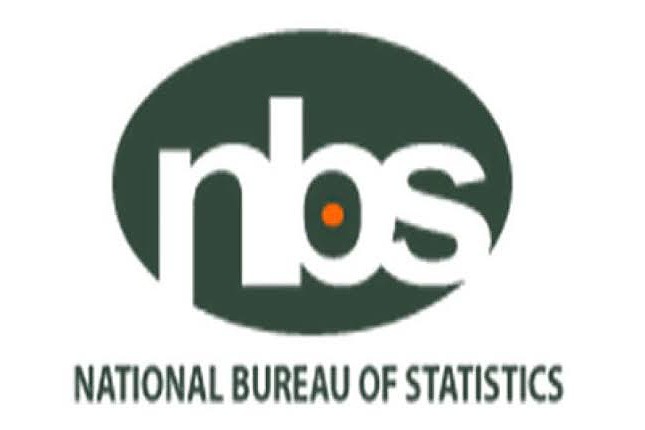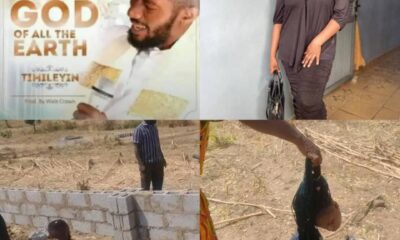Business
Textile, Food, Others Report N1 Trillion Loss In Q2 2023

During the second quarter of 2023, the food, textile, and 24 other sectors of the economy experienced a collective loss of over N1 trillion.
This loss occurred as twenty-six sectors of the economy, including fishing, crude petroleum and natural gas, cement, food, beverage and tobacco, textile, and others, contracted based on an analysis of Gross Domestic Product data from the Nigerian Bureau of Statistics.
Their combined contribution to the real GDP dropped from N7.69 trillion in the first quarter to N6.54 trillion in the second quarter of 2023.
Additional sectors that faced declines in Q2 2023 included post and courier services, publishing, motion pictures, sound recording and music production, arts, entertainment and recreation, financial institutions, real estate, professional, scientific and technical services, education, other services, metal ores, and plastic and rubber products.
The Nigerian Bureau of Statistics’ latest GDP report showed a slight increase in real GDP by 0.20 percentage points, reaching 2.51 percent in Q2 2023 from the previous 2.31 percent in Q1 2023.
It said, “Nigeria’s Gross Domestic Product (GDP) grew by 2.51 per cent (year-on-year) in real terms in the second quarter of 2023. This growth rate is lower than the 3.54 per cent recorded in the second quarter of 2022 and may be attributed to the challenging economic conditions being experienced.”
A shortage of cash in the first quarter of 2023 led to a contraction in the economy, causing the growth rate to decrease from 3.52 percent in Q4 2022 to 2.31 percent in Q1 2023.
The NBS stated, “Gross Domestic Product grew by 2.31 per cent (year-on-year) in real terms in the first quarter of 2023. This growth rate declined from 3.11 per cent recorded in the first quarter of 2022, and 3.52 per cent in the fourth quarter of 2022. The reduction in growth is attributed to the adverse effects of the cash crunch experienced during the quarter.”
Despite a quarter-on-quarter growth of 0.20 percentage points in Q2 2023, the persisting economic challenges kept growth below 3 percent. Inflation climbed for the sixth consecutive month, reaching 22.79 percent in June, which added strain to purchasing power.
Nigeria’s GDP growth falls short of the projections set by the International Monetary Fund, which anticipated a growth rate of 3.2 percent for 2023.
The decrease in economic activity is attributed to recent economic reforms that were expected to cause temporary discomfort.
Measures like the removal of fuel subsidy and the unification of exchange rates adversely affected businesses.
Manufacturers in Nigeria have been compelled to reduce their workforce due to the challenging economic conditions and decreased productivity, as stated by the Manufacturers Association of Nigeria.
Business
Savannah Energy Provides Unaudited FY 2024 Trading Updates

Savannah Energy has shared a trading update on its Nigerian operations and other markets in Africa, including up-to-date cash collections in its Nigerian business.
According to the update, made available on Thursday in Lagos, its gross production in Nigeria averaged 23.1 Kboepd for FY 2024, broadly in line with the prior year’s 23.6 Kboepd, of which 88% was gas (FY 2023: 91%).
On the update, CEO of Savannah Energy, Andrew Knott, said, “I am pleased to provide a FY trading update which demonstrates the continued progress we have made in 2024, a year which saw the highest level of cash collections ever recorded by our Nigerian business. 2025 is expected to be an exciting year for our Company: we have a large planned operational programme in Nigeria which is anticipated to enhance both our oil and gas production levels and capacity; we intend to progress our R3 East oil development project in Niger; we continue to pursue key acquisitions in the upstream oil and gas space; and we continue to seek to build our power business.
“Fundamentally, Savannah remains unequivocally an “AND” company, seeking to deliver strong performance both for the short AND long term across multiple fronts, and pursuing growth opportunities in both the hydrocarbon AND power sectors.”
The update It also shows that it generated a Total Income of US$393.6 million in 2024, compared to FY 2023’s US$289.8 million. This consists of Total Revenues of US$258.7 million and Other operating income of US$134.9 million.
The report also shows that Savannah’s FY 2024 Total Revenues were ahead of the previously issued financial guidance of greater than US$245 million, while FY 2024 financial guidance is reiterated for Operating expenses plus administrative expenses at ‘up to US$75 million’. The company expects its FY 2024 capital expenditure to come in lower than planned (previously guided at ‘up to US$50 million’) due to the phasing of spend.
ALSO READ: CSR: Dangote Awards Scholarships To 473 Students
According to the update, Savannah’s cash collections in 2024 amounted to US$248.5 million, a slight increase from the US$206 million it received in 2023. The report further shows that its cash balances as at 31 December 2024 stood at US$32.6 million, compared to the 31 December 2023 figure of US$107.0 million.
The report shows that the company’s midstream subsidiary, Accugas Limited, had as at 31 December 2024 drawn down on its NGN332 billion of the NGN Transitional Facility, with the resulting funds being converted to US$, which, along with cash held, was used to partially prepay the existing Accugas US$ Facility, leaving a balance as at 31 December 2024 of approximately US$212.3 million.
The report also provided new updates on Accugas’ US$45 million Uquo Central Processing Facility (“Uquo CPF”) compression project in Nigeria, noting that its commissioning which will enable the expansion of gas production in the medium term is well underway.
The report highlighted the progress being made in the procurement process of long lead equipment in Nigeria for a potential two-well drilling campaign on the Uquo Field in H2 2025, with an additional gas development well expected to add up to 80 MMscfpd of supplemental production capacity and a potential exploration well targeting an Unrisked Gross gas initially in place (“GIIP”) of 154 Bscf (25.7 MMboe) of incremental gas resources.
The update shows that progress is also being made in the planned Savannah acquisition of Sinopec International Petroleum Exploration and Production Company Nigeria Limited, whose principal asset is a 49% non-operated interest in the Stubb Creek oil and gas field (“Stubb Creek”), with regulatory approval and completion being targeted in Q1 2025. Following the completion of the acquisition, Savannah intends to commence an expansion programme which is anticipated to increase Stubb Creek gross production from an average of 2.7 Kbopd in 2024 to approximately 4.7 Kbopd.
In Niger, Savannah continues to seek to progress its 35 MMstb (Gross 2C Resources) R3 East oil development in South-East Niger, while it continues to push for a potential alternative transaction structure to acquire a material stake in producing oil and gas assets in South Sudan as previously announced on 20 December 2024.
On the renewable energy front, the update shows that Savannah has up to 696 MW of renewable energy projects currently in motion, including the up to 250 MW Parc Eolien de la Tarka wind farm project in Niger and the up to 95 MW Bini a Warak hybrid hydroelectric and solar project in Cameroon. A firm believer in Africa’s transition to renewable energy, Savannah continues to target a portfolio of up to 2 GW+ of power projects in motion by the end of 2026.
Business
Nigeria Can Achieve 5.5% GDP Growth – NESG
The Nigerian Economic Summit Group (NESG) has projected that the country has the potential to achieve a 5.5% growth in Gross Domestic Product (GDP) if critical policy reforms are sustained.
This was disclosed on Thursday during the launch of the NESG’s 2025 Macroeconomic Outlook report.
Speaking at the event, the Chief Economist and Director of Research & Development at NESG, Dr. Olusegun Omisakin, highlighted the need for more efficient policy implementation to unlock Nigeria’s economic potential.
READ MORE: Davido Is Richer Than His Billionaire Father – Ibrahim Chatta Claims
“We believe at the optimal level, if we embark on more efficient policy reforms, the Nigerian economy has the potential, the GDP to end up at 5.5 per cent, and we believe that this is achievable,” Omisakin stated.
More to follow……….
Business
CBN Approves Release Of Nigerian FX Code
The Central Bank of Nigeria (CBN) has announced the release of the Nigerian Foreign Exchange (FX) Code, a set of guidelines designed to promote ethical conduct among authorized dealers in the country’s FX market.
In a statement, the apex bank disclosed that the official launch of the Code would take place on Tuesday, January 28, 2025, at the CBN Head Office Auditorium in Abuja.
READ MORE: Dangote Denies Culpability In Pumping Up Petrol Price
“The Central Bank of Nigeria has approved the release of the Nigerian Foreign Exchange (FX) Code as a guideline to the banking industry to promote the ethical conduct of authorised dealers in the Nigerian Foreign Exchange Market,” the statement read.
The introduction of the FX Code is expected to enhance transparency, accountability, and professionalism within Nigeria’s foreign exchange ecosystem, aligning it with global best practices.
The event is anticipated to attract key stakeholders in the financial and banking sectors, as well as representatives from authorized FX-dealing institutions across the country.






















